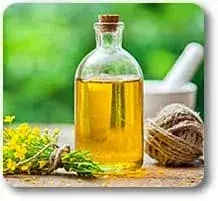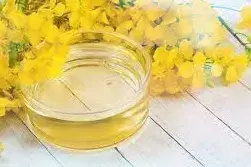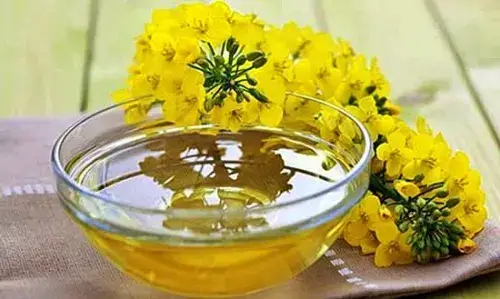Vegetable Oils. Rapeseed oil is steadily gaining popularity worldwide, including in Latvia. Many refer to it as “local olive oil,” a comparison that holds considerable weight given its surprisingly similar chemical composition and nutritional value.
What’s more, rapeseed oil is produced right here from rapeseed widely cultivated in Latvian fields. This makes it not only an economical but also an environmentally friendly choice.
So, why has rapeseed oil become such a respected competitor to other oil types like sunflower, soybean, or even olive oil in recent years? Let’s delve deeper into its properties and applications, exploring its journey from an industrial product to a culinary staple.
Vegetable Oils or Rapeseed Oil, The Nutritional Powerhouse and Composition and Value.
Rapeseed oil boasts an exceptional nutritional profile. Its composition typically includes:
• Valuable Fats: Approximately 35–50% healthy fats, including essential Omega-3 and Omega-6 fatty acids, which are crucial for human health.
• Proteins: 18–31% significant plant-based proteins, contributing to its overall nutritional density.
• Dietary Fiber: 5–7% fiber, beneficial for digestive health.
• Vitamin E: A substantial amount of Vitamin E (approximately 18.9 mg per 100g of product), a powerful antioxidant.
• Beta-Sitosterol: Up to 300 mg of beta-sitosterol, a plant sterol known for its potential to lower cholesterol.
• Phosphorus: An excellent source of phosphorus, vital for bone health and energy metabolism.
• Caloric Content: Around 899 kcal per 100g, making it an energy-rich food source.
This unique combination makes rapeseed oil a highly valuable component of a balanced diet.
The Evolution of Rapeseed Oil.
Initially, rapeseed oil was used exclusively for industrial purposes, as lubricants and in the production of candles and soaps. This was because early varieties contained harmful substances such as erucic acid and glucosinolates, which made it unsuitable for human consumption and could lead to health issues.
However, technological advancements revolutionized its use. In the 1970s, Canadian researchers developed special rapeseed varieties with significantly low erucic acid content, giving birth to what we now know as “Canola” oil (a portmanteau of “Canada” and “ola,” referring to oil).
Today, most rapeseed oil available in Latvia, and globally, is derived from these selectively bred varieties, making it entirely safe and highly beneficial for food consumption.
This transformation highlights the power of scientific innovation in adapting natural resources for human benefit.
How Rapeseed Oil is Made.
The rapeseed plant (Brassica napus) belongs to the Brassicaceae family, which also includes broccoli, cabbage, and mustard. In spring or summer, Latvian fields are blanketed in vibrant yellow flowers. These blossoms later develop into pods where the seeds ripen.
The oil is extracted from these seeds using one of two primary methods:
• Cold-Pressing: This mechanical method involves pressing the seeds without the use of high heat or chemical solvents.
Cold-pressed rapeseed oil retains more of its natural nutrients, has a more intense flavor and aroma, and is often preferred by those seeking a less processed product. However, it typically has a shorter shelf life due to its delicate nature.
• Solvent Extraction (Refined Oil): This method involves using chemical solvents to extract the oil from the seeds, followed by a refining process that removes impurities, strong flavors, and odors.
Refined rapeseed oil has a more neutral taste, a higher smoke point, and a much longer shelf life, making it suitable for a wider range of culinary applications, including high-heat cooking.
Understanding these production methods helps consumers make informed choices based on their culinary needs and health preferences.
Culinary Applications of Rapeseed Oil and Tips for Optimal Use.
Rapeseed oil is remarkably versatile in the kitchen.
Highly Recommended Uses:
• Raw Applications: Rapeseed oil is perfectly suited for use in its unheated form. It makes an excellent base for salad dressings, marinades, and as a finishing oil for grain dishes and roasted vegetables. Its mild, slightly nutty flavor complements a variety of ingredients.
• Dressings: It pairs beautifully with lemon juice, honey, or mustard, creating exquisite salad vinaigrettes. For instance, a simple dressing of rapeseed oil, fresh lemon juice, a touch of Dijon mustard, salt, and pepper can elevate any green salad.
Less Recommended Uses (and Important Considerations):
• High-Heat Frying: It is generally less advisable to use unrefined rapeseed oil for deep-frying or very high-temperature cooking. During intense thermal processing, potentially carcinogenic compounds can form, and the oil may emit an unpleasant odor.
• For Frying, Choose Wisely: If you do need to fry with rapeseed oil, opt for refined rapeseed oil, which has a significantly higher smoke point (the temperature at which an oil begins to smoke and break down). This makes it more stable for sautéing and light frying. Always be mindful of the oil’s smoke point to ensure food safety and quality.
Nine Key Health Benefits of Rapeseed Oil.
Incorporating rapeseed oil into your diet can offer a range of health advantages:
1. Immunity Boost: Thanks to its rich antioxidant content, rapeseed oil helps strengthen the body’s natural defenses against free radicals and oxidative stress.
2. Cardiovascular Health: It plays a role in reducing “bad” cholesterol (LDL) levels and can lower the risk of thrombosis, contributing to a healthier heart and circulatory system.
3. Hormonal Balance: Particularly beneficial for women, it can help support hormonal fluctuations due to its balanced fatty acid profile.
4. Oncology Prevention: The presence of carotenoids and Vitamin E helps mitigate the impact of free radicals, which are implicated in the development of certain cancers.
5. Digestive Health: Rapeseed oil can have a soothing and healing effect on the digestive system, promoting overall gut health.
6. Nervous System Stabilization: Its nutritional components can help reduce stress and improve sleep quality, contributing to a more stable nervous system.
7. Pregnancy and Lactation Support: It provides essential fatty acids crucial for fetal development and maternal health during pregnancy and breastfeeding.
8. Joint Health: When applied externally, it can help alleviate pain and inflammation associated with joint issues.
9. Skin Care: Used topically, it can be beneficial for conditions like psoriasis, eczema, and dry skin on hands and face due to its moisturizing and emollient properties.
Potential Drawbacks and Precautions with Rapeseed Oil.
Despite its numerous benefits, it’s crucial to be aware of potential risks. The harmful component, erucic acid, can pose problems if its concentration is too high.
This is why the permissible limit in the European Union is no more than 0.5%. Always read the label and choose trusted manufacturers to ensure you are purchasing low-erucic acid varieties suitable for consumption.
Rapeseed oil is generally not recommended for:
• Children under 1 year of age: Their digestive systems are still developing.
• Individuals with liver diseases or pancreatitis: These conditions may be exacerbated by certain fats.
• Those suffering from diarrhea or who are sensitive to the product: It may worsen symptoms in individuals with digestive sensitivities.
Always consult a healthcare professional or registered dietitian if you have concerns about incorporating new foods into your diet, especially if you have pre-existing health conditions.
Rapeseed Oil in Beauty and Personal Care.
Beyond the kitchen, rapeseed oil is also a valuable ingredient in cosmetology, prized for its nourishing properties:
• For Dry Skin: It’s an excellent base for hydrating masks, often combined with ingredients like honey and cream to deeply moisturize and restore skin’s suppleness.
• Acne Treatment: Pure oil can be gently applied to problematic areas to help soothe inflammation and promote healing, thanks to its anti-inflammatory compounds.
• Hair Care: A mixture of kefir, salt, and rapeseed oil can be used as a hair mask to restore shine and strength, deeply conditioning the hair and scalp.
Rapeseed Oil and Weight Management.
When consumed in moderation, rapeseed oil can actually support weight loss efforts. It can help accelerate metabolism, reduce appetite, and improve fat metabolism.
A common recommendation is to consume a tablespoon of rapeseed oil on an empty stomach in the morning or incorporate it into vegetable dishes. Its healthy fats contribute to satiety, helping you feel fuller for longer and potentially reducing overall calorie intake.
Storage and Usage Recommendations.
To maintain the quality and extend the shelf life of rapeseed oil, it’s advisable to:
• Store Properly: Keep it in a dark, cool place in a tightly sealed bottle, away from direct sunlight and heat, which can cause oxidation and spoilage.
• Moderate Intake: Do not exceed the recommended daily allowance, which is approximately 1–2 tablespoons per day for an adult. While healthy, excessive consumption of any oil can contribute to excess calorie intake.
• Combine with Other Oils: Incorporate rapeseed oil as part of a varied diet that includes other healthy oils like olive oil or flaxseed oil to ensure a broad spectrum of beneficial fatty acids.
Useful Tips.
• Vitamin E Powerhouse: Just one tablespoon of rapeseed oil can provide approximately three times an adult’s daily requirement of Vitamin E, highlighting its potent antioxidant benefits.
• Lemon Pairing: Rapeseed oil pairs wonderfully with lemon juice. This simple dressing can enhance salads made with tomatoes, cucumbers, and bell peppers. This versatile mixture can also serve as a base for homemade mayonnaise, which can be used in conjunction with other oils for a customized flavor profile.
Which countries use the most rapeseed oil?
The consumption of rapeseed oil is largely driven by its use in food processing and, in some regions, for biofuel production. Based on recent data, the Asia Pacific region holds the largest market share in terms of consuming rapeseed oil. Specifically, the countries that consume the most rapeseed oil are:
China: Consistently the largest consumer of rapeseed oil globally. It is heavily used in their culinary traditions and food processing industry.
United States: A significant consumer, driven by increasing awareness of its health benefits.
India: Another major consumer, with its vast population and cultural culinary traditions favoring rapeseed oil.
Japan: A notable consumer in Asia.
European Union (as a bloc): While individual European countries like Germany and France are large producers and consumers (often for biofuel as well), the EU as a whole represents a substantial market.
It’s important to distinguish between consumption and production. While countries like Canada are leading producers and exporters of rapeseed oil (often referred to as canola oil), a significant portion of their production is exported to meet the demand in other consuming nations.
Conclusion.
Rapeseed oil stands out as an exceptional Latvian product, offering valuable nutrients, economic affordability, and versatile applications. It can  confidently stand alongside olive oil as a staple in daily nutrition – particularly for salads, dressings, and drizzled over vegetables or grains.
confidently stand alongside olive oil as a staple in daily nutrition – particularly for salads, dressings, and drizzled over vegetables or grains.
While some nutritionists may still debate its potential risks, high-quality refined oil from safe, low-erucic acid varieties offers far more benefits than harm.
By supporting local production and choosing healthy products like rapeseed oil, we not only prioritize our own well-being but also contribute to environmental sustainability and the local economy.
It’s worth noting that while olive oil often emphasizes its monounsaturated fatty acid content, rapeseed oil contains both Omega-3 and Omega-6 fatty acids, making it equally, if not more, valuable in terms of essential fatty acid profiles.
Remember, it’s preferable to use rapeseed oil less for pan-frying and more as an additive to finished dishes, such as salads, buckwheat, or boiled potatoes.
Just like other oils, rapeseed oil should be stored in a sealed container in a dark and cool place. Knowing that rapeseed grows abundantly in Latvia only adds to its appeal.
Enjoy your meal and embrace a healthy lifestyle!




